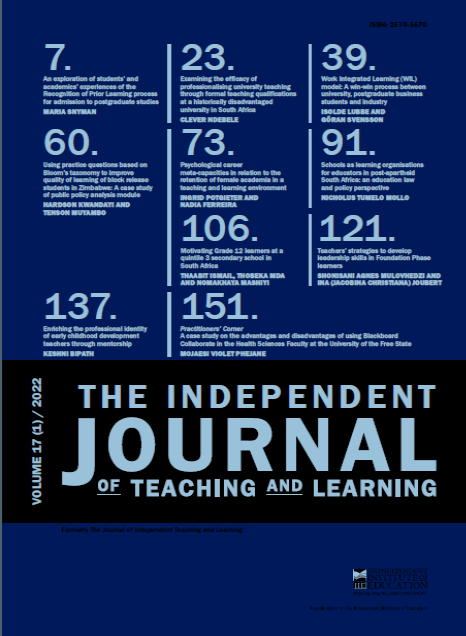A case study on the advantages and disadvantages of using Blackboard Collaborate in the Health Sciences Faculty at the University of the Free State
DOI:
https://doi.org/10.17159/jbzb5q30Keywords:
learning management system (LMS), Blackboard Collaborate, Open Education, technologyAbstract
Using a case study approach, this paper aims to explore the advantages and disadvantages of using Blackboard Collaborate as a tool for achieving increased access to Online education and training. The Health Sciences Faculty at a South African university uses methods of open education practices through Blackboard Collaborate for students in the Free State and across South Africa as well as internationally. The qualitative interpretive paradigm with descriptive research methods was used with seven lecturers and personnel interviewed on the effectiveness of this tool in supporting students’ online learning, backed by the Constructivist Learning theory. The use of Blackboard Collaborate effectively assists students who work and cannot attend classes to gain access to information through recorded videos and attending seminars online. Student grades improved in one of the modules: Interprofessional Education (NVER 4518/IPE), which relied on the use of Blackboard Collaborate. Findings show an improvement in student engagement in modules like MBchB_1-5 through the extensive use of Blackboard Collaborate, for not only delivering lessons but also in relaying essential messages. Using Blackboard Collaborate does not only help improve student grades but also opens possibilities of increased access to education and training opportunities. Blackboard Collaborate is used for multiple educational reasons such as broadcasting seminars, Departmental meetings, classes, first-year welcoming into the university as well as hosting tutorials online in aiding student access and success. Recommendations include advantages and disadvantages of using Blackboard Collaborate, feedback on the experiences and improvements in using this online teaching and learning teaching tool to achieve sustainable Open Education practices successfully.
References
Arkorful, A. & Abaidoo, N. (2015) The role of e-learning, advantages and disadvantages of its adoption in higher education. International Journal of Instructional Technology and Distance Learning 12(1) pp.28-42.
Clancey, W. J. (2010) A design framework for integrating instruments, software, processes, and organization in telerobotic mission operations: Experience with the Mars Exploration Rovers. Presented at the Design Theory Workshop of the International Design Society, Mines Paristech (School of Mines of Paris), February.
Department of Education. (1997) Policy Document: A programme for the transformation of Higher Education. Education White Paper 3 (July 1997), Pretoria: Government Printers.
Ehlers, U. (2011) From open educational resources to open educational practices. E-Learning Papers, 23 pp.1-8.
Eiffelcorp. (2019) Fundamentals of digital teaching and learning. Blackboard: Digital Teaching and Learning Series, Johannnesburg, South Africa.
Elsamanoudy, A.Z., Fayz, A.F. & Hassanien, M. (2020) Adapting Blackboard-Collaborate Ultra as an Interactive Online Learning Tool during the COVID-19 Pandemic. Journal of Microscopy and Ultrastructure 8 pp.213-215. DOI: https://doi.org/10.4103/JMAU.JMAU_26_20
Harasim, L. (2012) Learning Theory and Online Technologies. Routledge: New York. DOI: https://doi.org/10.4324/9780203846933
Issroff, K. & Scanlon, E. (2002) Educational Technology: The Influence of Theory. Journal of Interactive Media in Education (6), http://doi.org/10.5334/2002-6 DOI: https://doi.org/10.5334/2002-6
Jordaan, M. (2015) Using Blackboard Collaborate as a reflection tool in a service-learning module. Service learning: 9th Annual Teaching and Learning in Higher Education Conference. Durban
Keengwe, J. & Kidd, T.T. (2010) Towards Best Practices in Online Learning and Teaching in Higher Education. MERLOT Journal of Online Learning and Teaching 6(2) pp.533-541.
Koschmann, T.D. (1994) Introduction: toward a theory of computer support for collaborative learning. The Journal of the Learning Sciences 3(3) pp.219-225. DOI: https://doi.org/10.1207/s15327809jls0303_1
Olusegun, B.S. (2015) Constructivism learning theory: A paradigm for teaching and learning. Journal of Research & Method in Education 5(16) pp.66-70.
Ouyang, J. & Nile, S. (2014) Theories and research in educational technology and distance learning instruction through blackboard. Universal Journal of Educational Research 2(2) pp.161-172. DOI: https://doi.org/10.13189/ujer.2014.020208
Picciano, A.G. (2017) Theories and frameworks for online education: seeking an integrated model. Online Learning, 21(3) pp.166-190. DOI: https://doi.org/10.24059/olj.v21i3.1225
Schunk, D. (2013) Learning Theories. Harlow: Pearson Education UK.
Zaki, H. & Zawaidy, H. (2014) Using Blackboard in online learning at Saudi Universities: Faculty member’s perceptions and existing obstacles. International Interdisciplinary Journal of Education 3(7) pp.1-10. DOI: https://doi.org/10.12816/0006902
Downloads
Published
Issue
Section
License
Copyright (c) 2022 The Independent Journal of Teaching and Learning

This work is licensed under a Creative Commons Attribution 4.0 International License.






.png)